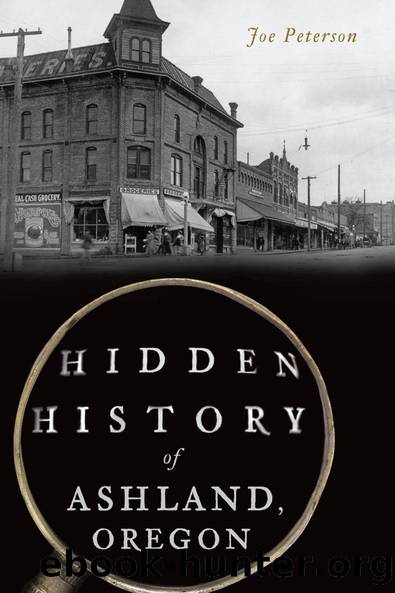Hidden History of Ashland, Oregon by Joe Peterson

Author:Joe Peterson [Peterson, Joe]
Language: eng
Format: epub
Tags: History, United States, State & Local, General
ISBN: 9781467144919
Google: uejwDwAAQBAJ
Publisher: Arcadia Publishing
Published: 2020-08-03T03:36:49+00:00
Early 1920s Ku Klux Klan march in downtown Ashland. Authorâs collection.
Unlike the Southern Klan, which most Americans learned about in school, the 1920s KKK groomed its public persona and stressed its non-violent nature and progressive legislative goals. The 1922 Oregon School Bill was the Klanâs most successful legislative effort. Scottish Rite Masons actually introduced the proposed legislation, and the Klan was quick to promote it as a very American, non-elitist law. Although similar bills were introduced in other states, Oregonâs was the only successful measure. The bill made a public-school education required for any child between the ages of eight and sixteen; this, the Klan maintained, showed its benevolent concern for the education of children. It was free, public education, after all, that made Americaâs âmelting potâ work. Besides, as one Jackson County parent opined, âWhat is good enough for my children is good enough for anybodyâs children.â A one-hundred-dollar-per-day fine was to be levied against non-complying parents.
The Klanâs real goal for the compulsory school law was to block the existence of Catholic schools. Jacksonville had the only parochial school in Southern Oregon at the time. Public schools held the promise of American unity by teaching a common history, language and value system. Requiring young people to get such an education certainly sounded like a worthy effort, and the proposed law got a large majority vote in Ashland. However, by 1925, both the Oregon and U.S. Supreme Courts had declared the legislative act unconstitutional, and the law was never implemented. Other Klan initiatives that appealed to mainstream citizens included support for improved state roads and greater funding for public education.
Most Ashlanders did not formally join the Klan, and the vast majority of those who did tended to be ordinary citizens. Former Ashland Klansmen often explained that, to them, the organization seemed to be more of a fraternal club than a terrorist group. The local Klan held picnics, helped some unfortunate citizens with food and clothing and conducted citizenship ceremonies. These activities legitimized the KKK in the eyes of many by making it look like any other fraternal group. Some in Ashland, which was a mostly dry town overwhelmingly made up of white, native-born Christians, found the cleverly rebranded Klanâs messages appealing, as they felt that their rural values were increasingly questioned, and their country was changing. In the early 1920s, a Ku Klux Klan chapter in Ashland was not as much of an aberration as it may appear to be. In fact, one could argue that it would have been odd if 1920s Ashland, with its demographic and political profile, had not joined the forty-nine other Oregon towns and cities with Klan chapters.
Download
This site does not store any files on its server. We only index and link to content provided by other sites. Please contact the content providers to delete copyright contents if any and email us, we'll remove relevant links or contents immediately.
| United States |
In Cold Blood by Truman Capote(3386)
The Innovators: How a Group of Hackers, Geniuses, and Geeks Created the Digital Revolution by Walter Isaacson(3217)
Steve Jobs by Walter Isaacson(2899)
All the President's Men by Carl Bernstein & Bob Woodward(2379)
Lonely Planet New York City by Lonely Planet(2227)
And the Band Played On by Randy Shilts(2210)
The Room Where It Happened by John Bolton;(2161)
The Poisoner's Handbook by Deborah Blum(2141)
The Innovators by Walter Isaacson(2106)
The Murder of Marilyn Monroe by Jay Margolis(2103)
Lincoln by David Herbert Donald(1992)
Being George Washington by Beck Glenn(1982)
A Colony in a Nation by Chris Hayes(1937)
Under the Banner of Heaven: A Story of Violent Faith by Jon Krakauer(1807)
Amelia Earhart by Doris L. Rich(1700)
The Unsettlers by Mark Sundeen(1692)
Dirt by Bill Buford(1682)
Birdmen by Lawrence Goldstone(1670)
Zeitoun by Dave Eggers(1655)
